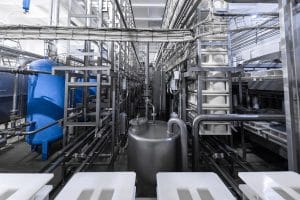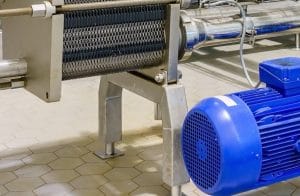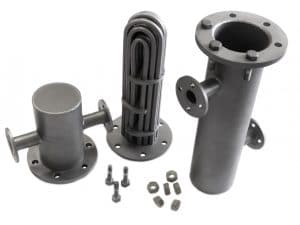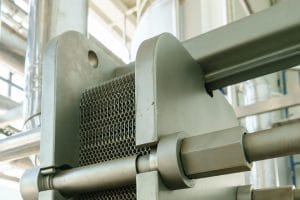 One of the main benefits of modern heat exchangers is their ability to make electrical thermal management an efficient and cost-effective process. That’s also one of the most important reasons why they continue to be vital aspects of most industries. Electrical thermal management and the solutions traditionally used to address it were once considered necessary, but heavy, burdens for companies to bear. After the implementation of more advanced heat exchangers, however, it became a much less complicated, less costly, and more reliable aspect of operations in most industries. (more…)
One of the main benefits of modern heat exchangers is their ability to make electrical thermal management an efficient and cost-effective process. That’s also one of the most important reasons why they continue to be vital aspects of most industries. Electrical thermal management and the solutions traditionally used to address it were once considered necessary, but heavy, burdens for companies to bear. After the implementation of more advanced heat exchangers, however, it became a much less complicated, less costly, and more reliable aspect of operations in most industries. (more…)
Making Heat Exchangers Work for Every Industry
 In most industries today, technology is more than a fad; it’s the backbone of most companies’ operations. Part of that backbone includes systems of electrical thermal management that, for better or worse, have a significant impact on the efficiency and productivity of the technology. Traditionally, most thermal management solutions included HVAC technologies, such as air conditioners. They’re effective enough at preventing electrical overheating that they were viable for most applications. However, today, modern heat exchangers have become a much more common solution, and companies in all industries continue to benefit from their advanced, eco-friendly, and high-performance heat transfer capabilities. (more…)
In most industries today, technology is more than a fad; it’s the backbone of most companies’ operations. Part of that backbone includes systems of electrical thermal management that, for better or worse, have a significant impact on the efficiency and productivity of the technology. Traditionally, most thermal management solutions included HVAC technologies, such as air conditioners. They’re effective enough at preventing electrical overheating that they were viable for most applications. However, today, modern heat exchangers have become a much more common solution, and companies in all industries continue to benefit from their advanced, eco-friendly, and high-performance heat transfer capabilities. (more…)
Meeting NEMA Enclosure Standards with Heat Exchangers
 Technology has always been a part of modern industry in some form or another, and these days, it’s a dominant factor in any company’s operations. That includes those in industries that traditionally work in conditions that require additional safety and precautionary measures. Electrical enclosures, control panels, and more that are exposed to higher-than-usual risks of contamination or overheating must often adhere strictly the standards set forth by the National Electrical Manufacturers Association (NEMA). These standards help ensure the safety of employees and the environment in which certain forms of technology operate. They can also make implementing an effective thermal management solution more challenging, which is one reason why heat exchangers are often recommended for them. (more…)
Technology has always been a part of modern industry in some form or another, and these days, it’s a dominant factor in any company’s operations. That includes those in industries that traditionally work in conditions that require additional safety and precautionary measures. Electrical enclosures, control panels, and more that are exposed to higher-than-usual risks of contamination or overheating must often adhere strictly the standards set forth by the National Electrical Manufacturers Association (NEMA). These standards help ensure the safety of employees and the environment in which certain forms of technology operate. They can also make implementing an effective thermal management solution more challenging, which is one reason why heat exchangers are often recommended for them. (more…)
Automated Technology and Heat Exchangers’ Role in It
 Automated systems and software have been among the most significant advancements in technology over the last few decades. From streamlining customer service processes and administrative work with automated computer software to making manufacturing and production process vastly more efficient with automated machinery, the impact has been felt across virtually every industry. In many ways, that advancement has been thanks to the wide-scale implementation of custom thermal solutions such as heat exchangers, which make the process of electrical much more efficient and low-maintenance than traditional electrical cooling solutions. (more…)
Automated systems and software have been among the most significant advancements in technology over the last few decades. From streamlining customer service processes and administrative work with automated computer software to making manufacturing and production process vastly more efficient with automated machinery, the impact has been felt across virtually every industry. In many ways, that advancement has been thanks to the wide-scale implementation of custom thermal solutions such as heat exchangers, which make the process of electrical much more efficient and low-maintenance than traditional electrical cooling solutions. (more…)
Prioritizing Thermal Management in an Application’s Design
 One of the biggest advantages to modern heat exchangers and other custom thermal solutions is that they can often be customized or retrofitted to fit most existing applications. For companies that only need to revamp their electrical thermal management systems, this allows them to do so without having to invest in completely new technologies and equipment. As new technologies emerge, many fail to take optimal thermal management into consideration, which makes customizable heat exchangers even more advantageous. However, many new technologies are created with advanced, high-performance electrical cooling as part of their central designs. To accomplish this, designers often rely on advanced heat exchanger technology, working closely with thermal management experts to ensure optimal cooling from the start. (more…)
One of the biggest advantages to modern heat exchangers and other custom thermal solutions is that they can often be customized or retrofitted to fit most existing applications. For companies that only need to revamp their electrical thermal management systems, this allows them to do so without having to invest in completely new technologies and equipment. As new technologies emerge, many fail to take optimal thermal management into consideration, which makes customizable heat exchangers even more advantageous. However, many new technologies are created with advanced, high-performance electrical cooling as part of their central designs. To accomplish this, designers often rely on advanced heat exchanger technology, working closely with thermal management experts to ensure optimal cooling from the start. (more…)
Customized Cooling in Extreme, Hazardous Conditions
 Electrical thermal management has come a long way over the last several decades, and most industries can thank heat exchangers for much of that advancement. By introducing the concept of transferring electrical waste heat instead of relying on more costly and complicated HVAC methods, heat exchangers made it possible for companies to substantially lower the costs of keeping their equipment running smoothly. Today, various types of heat exchangers are at the forefront of the push towards customized, high-performance thermal management solutions, even under conditions that require substantial protection due to extreme, hazardous conditions. (more…)
Electrical thermal management has come a long way over the last several decades, and most industries can thank heat exchangers for much of that advancement. By introducing the concept of transferring electrical waste heat instead of relying on more costly and complicated HVAC methods, heat exchangers made it possible for companies to substantially lower the costs of keeping their equipment running smoothly. Today, various types of heat exchangers are at the forefront of the push towards customized, high-performance thermal management solutions, even under conditions that require substantial protection due to extreme, hazardous conditions. (more…)
3 Ways Heat Exchangers Contribute to Greener Energy
 Factors like cost-effectiveness, efficiency, and productivity have always been major concerns in any business. They’ve also been areas in which modern heat exchangers have consistently helped companies streamline their operations by simplifying electrical and other thermal management processes. These days, however, eco-friendliness and the ability to leave minimal or no environmental footprint is becoming equally important. In addition to lowering costs and boosting productivity, companies also have to focus on implementing ways to operate greener. In many instances, heat exchangers help make that easier, as well. (more…)
Factors like cost-effectiveness, efficiency, and productivity have always been major concerns in any business. They’ve also been areas in which modern heat exchangers have consistently helped companies streamline their operations by simplifying electrical and other thermal management processes. These days, however, eco-friendliness and the ability to leave minimal or no environmental footprint is becoming equally important. In addition to lowering costs and boosting productivity, companies also have to focus on implementing ways to operate greener. In many instances, heat exchangers help make that easier, as well. (more…)
Choosing Between Cold Plates and Heat Pipes
 Today’s heat exchangers and similar thermal management solutions come in all shapes and sizes, utilize a variety of heat transfer methods, and can often be customized to meet the unique needs of the most innovative applications. Many of the most common variations involve the use of high-performance heat pipes or liquid cold plate heat exchangers, depending on the application’s specific needs and preferences. While both designs offer many important, wide-ranging benefits, those benefits differ depending on the specific company, industry, and application for which the solution is being used. (more…)
Today’s heat exchangers and similar thermal management solutions come in all shapes and sizes, utilize a variety of heat transfer methods, and can often be customized to meet the unique needs of the most innovative applications. Many of the most common variations involve the use of high-performance heat pipes or liquid cold plate heat exchangers, depending on the application’s specific needs and preferences. While both designs offer many important, wide-ranging benefits, those benefits differ depending on the specific company, industry, and application for which the solution is being used. (more…)
A Look at Modern Heat Exchanger Design Concepts
 There are many different methods for achieving optimal electrical cooling results, but in many cases, heat exchanger technology provides the most effective and efficient solutions. Their well-known success can be attributed to several different factors, from the more eco-friendly and sustainable methods of transferring heat they utilize to the minimal space and high customizability of their designs. For the companies that rely on heat exchangers and the technologies that they empower, their day-to-day benefits are significant. (more…)
There are many different methods for achieving optimal electrical cooling results, but in many cases, heat exchanger technology provides the most effective and efficient solutions. Their well-known success can be attributed to several different factors, from the more eco-friendly and sustainable methods of transferring heat they utilize to the minimal space and high customizability of their designs. For the companies that rely on heat exchangers and the technologies that they empower, their day-to-day benefits are significant. (more…)
Important Benefits of Custom Cold Plate Heat Exchangers
 After becoming a staple of electrical enclosure cooling and other advanced thermal management processes, heat exchangers quickly became a catalyst for innovation. They gave designers and consumers of technology the ability to create and implement faster, more powerful, and more reliable thermal management solutions. Heat exchangers themselves also now come in a wide range of highly customizable types to meet most modern applications’ needs. Today, cold plates are one of the most popular options. Utilizing metal cold plates with flow paths custom-machined into them, the innovative heat spreaders can transfer large amounts of electrical waste heat with minimal energy and within extremely limited spaces. (more…)
After becoming a staple of electrical enclosure cooling and other advanced thermal management processes, heat exchangers quickly became a catalyst for innovation. They gave designers and consumers of technology the ability to create and implement faster, more powerful, and more reliable thermal management solutions. Heat exchangers themselves also now come in a wide range of highly customizable types to meet most modern applications’ needs. Today, cold plates are one of the most popular options. Utilizing metal cold plates with flow paths custom-machined into them, the innovative heat spreaders can transfer large amounts of electrical waste heat with minimal energy and within extremely limited spaces. (more…)







